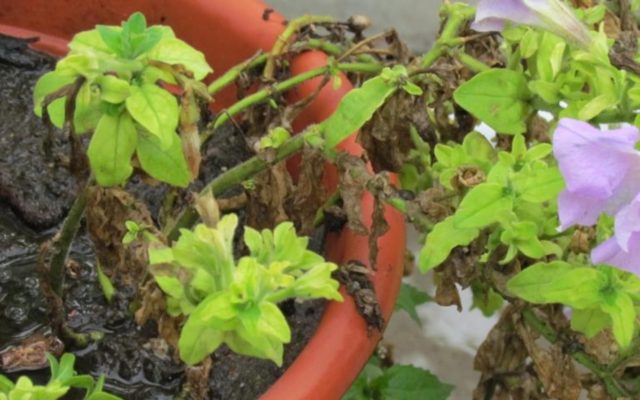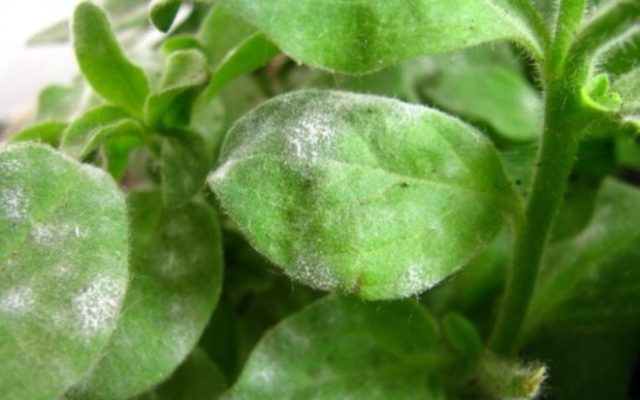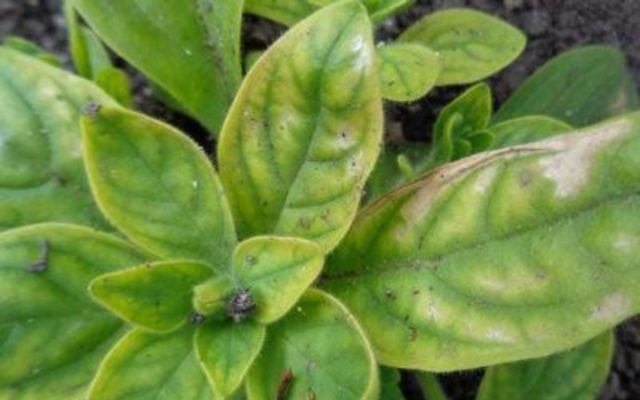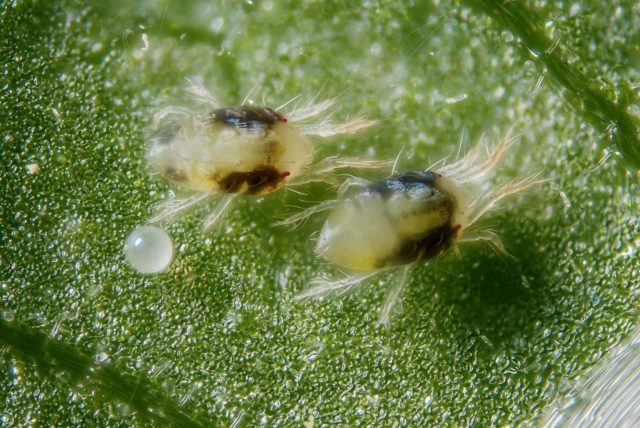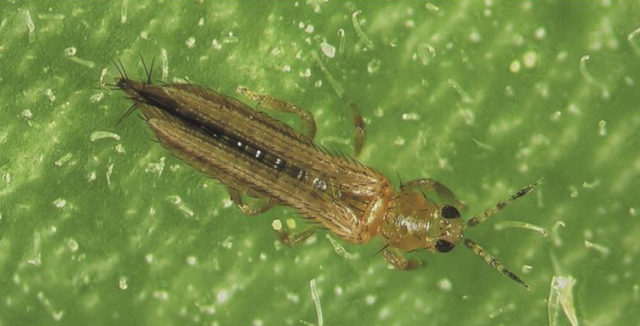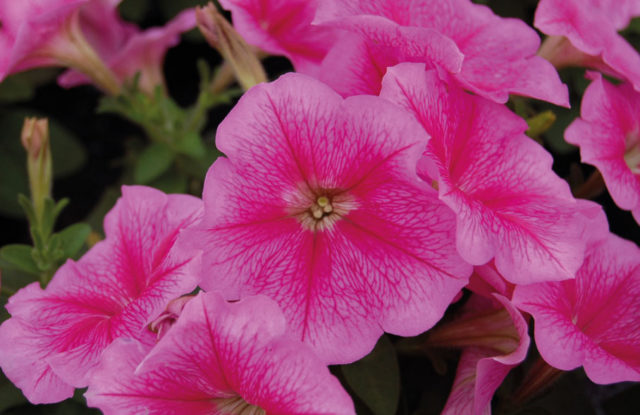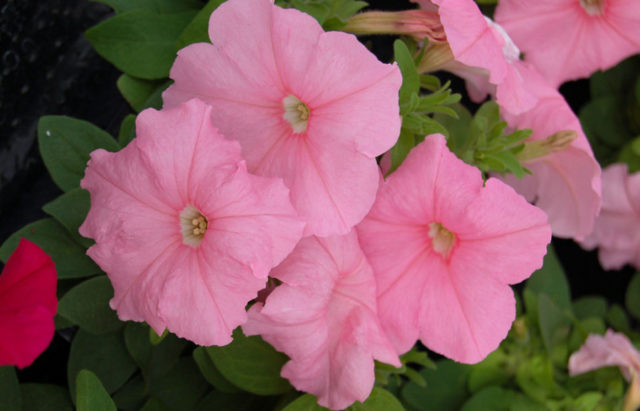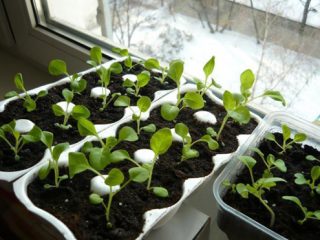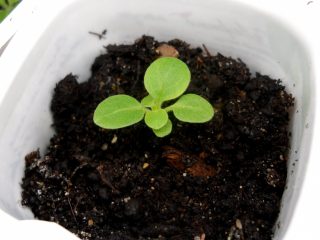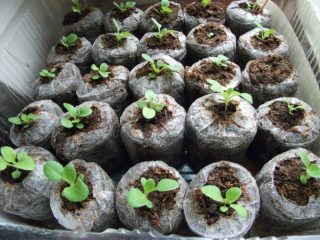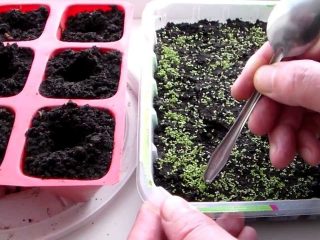Content
- 1 Breeding history
- 2 Description of the variety of petunia Mambo and characteristics
- 3 Varieties of petunia
- 4 Advantages and disadvantages of the variety
- 5 Reproduction methods
- 6 Growing and care
- 7 Pests and diseases
- 8 Application in landscape design
- 9 Conclusion
- 10 Reviews with a photo of a multi-flowered petunia Mambo F1
Petunia Mambo (Mambo F1) is a low-growing multi-flowered crop variety that has gained wide popularity among gardeners. And the variety of colors of her flowers only contributes to this. The hybrid is highly resistant to adverse weather conditions, as well as pests and diseases.
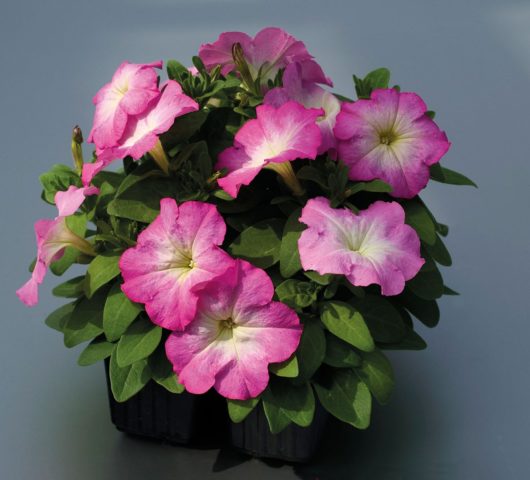
Mambo is characterized by abundant flowering throughout the season.
Breeding history
Until the middle of the last century, all varieties of petunias were presented in only three main colors: white, pink and purple. At the same time, the bushes did not differ in particular decorativeness and compactness. But soon everything changed.
The originator of the Mambo series is the Dutch company Hem Genetics, which was founded in 1998. It was thanks to the efforts of its employees that multistage breeding of petunia was carried out, which made it possible to obtain new hybrid forms of this culture. Dwarf species with numerous buds and high resistance to adverse factors have become a real breakthrough. Among them is the Mambo series, which was developed at the beginning of the 20th century.
Description of the variety of petunia Mambo and characteristics
Petunia Mambo, like other crops, belongs to the Solanaceae family, so it is a close relative of tomatoes and potatoes. The varieties of this series are distinguished by low-growing spreading bushes that do not lose their shape throughout the season.
The plant is characterized by rounded, branchy shoots, the height of which does not exceed 30 cm. They can be creeping or erect, depending on the variety. The leaves of the Mambo petunia are sessile, simple, arranged alternately on the stems. The shade of the plates varies from light to dark green.
The flowers of the Mambo petunia have the shape of a gramophone. They consist of five petals fused together. When fully expanded, their diameter varies from 6 to 9 cm. At the base of the flowers, there are five interconnected sepals, on the surface of which you can see a dense edging. The buds of the Mambo petunia are single, they grow from the leaf axils, have short petioles. The color of the flowers is very varied.
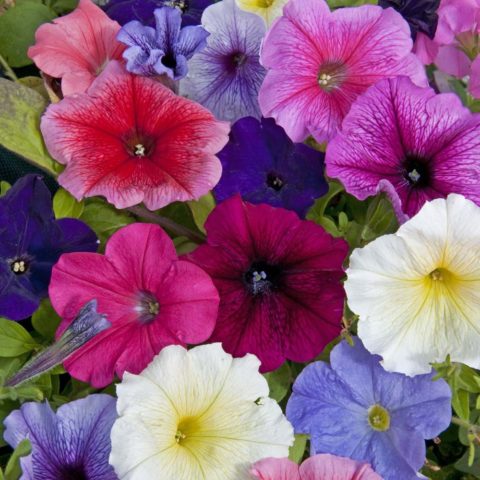
The Mambo series includes both monochromatic and two-color types
The buds of the varieties of this series are elongated and elongated. They form at an accelerated rate, giving the impression of continuous flowering. The whole process takes about 5 days, and not a week, like with other species.
The root system of the Mambo petunia is powerful, well-developed. They are of a rod type with a huge number of adventitious processes, which provide the aerial part with all nutrients and water.
These varieties of culture are moisture-loving, but at the same time they do not tolerate prolonged stagnation of water in the soil.In this case, petunia Mambo can be affected by fungal diseases. She also easily tolerates temperature changes. And it can withstand a short-term cold snap up to +10 degrees.
According to reviews and photos, petunia Mambo, when grown, forms a flower ball, on which the foliage is practically invisible due to the numerous buds.
Varieties of petunia
This series includes many types. Some of them are characterized by large flowers, others - small, but at the same time they form a huge number of them. To understand the diversity of this hybrid form, you should consider some varieties separately in order to get a complete picture of them.
Petunia Mambo F1 Burgundy
Mambo F1 Burgundy (Mambo Burgundy) is a fast growing compact annual variety. Forms lush bushes no more than 30 cm high. Despite its small size, the shrub forms numerous buds that completely cover the foliage. This petunia variety needs regular plucking of the tops of the stems. The color of the flower is monophonic, dark cherry, reminiscent of wine, which was the name.
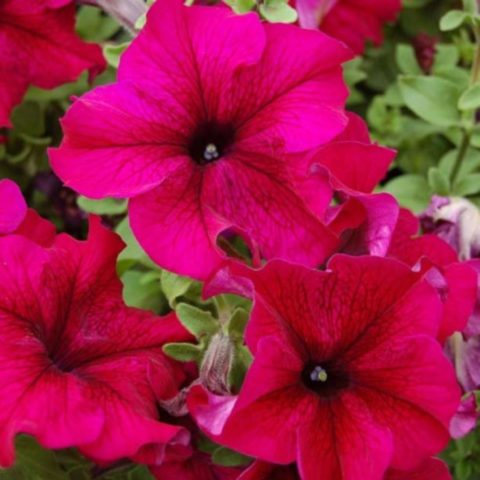
With full disclosure, the flower diameter of the Mambo F1 Burgundy reaches 8 cm
Petunia multiflora Mambo G.P.
A novelty variety belonging to the multiflora category. This petunia is characterized by small, deep purple flowers. Their diameter does not exceed 6 cm. The height of the bushes reaches 20 cm. A distinctive feature is the preservation of low growth throughout the entire growing season.
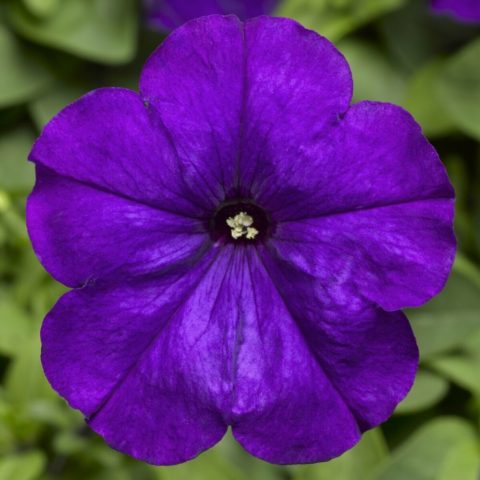
Petunia variety Mambo G.P. is resistant to bad weather
Petunia Mambo purple
An unpretentious variety that is able to withstand short-term drought without losing its decorative effect. Suitable for growing in balcony boxes and outdoors. The plant retains its shape during the season, does not stretch. The height of the bushes of the Mambo purple petunia reaches 25-30 cm.The color of the flowers is monochromatic, deep purple. The diameter at full opening of the buds is 7-8 cm.
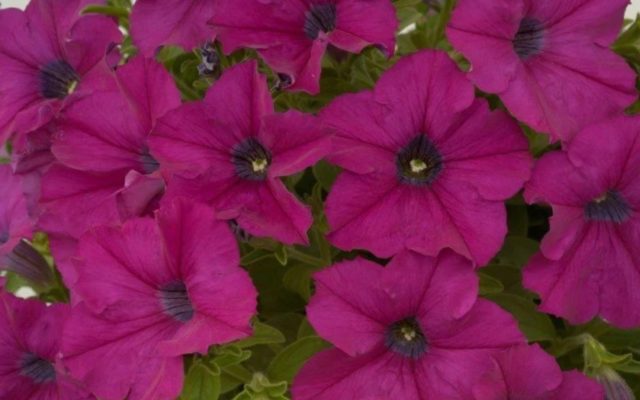
Petunia Mambo purple belongs to the category of early flowering species
Petunia multifloral Mambo F1 white
This dwarf petunia hybrid does not require growth regulation. It forms compact sprawling bushes 20-25 cm high. Petunia multifloral Mambo F1 white is characterized by numerous flowers, the diameter of which does not exceed 6 cm. They retain a bright shade throughout the entire life cycle.
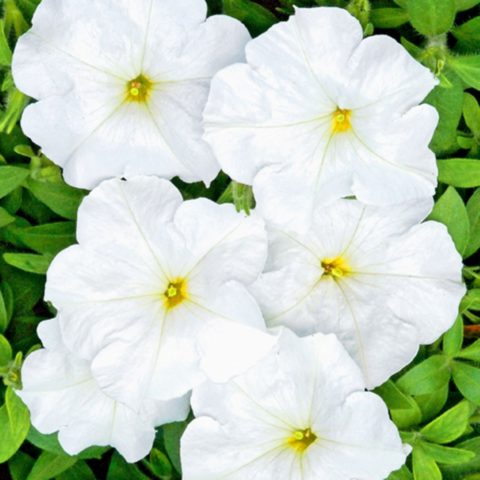
Variety of petunia Mambo white is resistant to rain
Mambo F1 red
This species belongs to the category of large-flowered, but at the same time it is one of the first to bloom. The bush is compact, the length of the shoots is 20 cm. The shade of the gramophone flowers is deep red, which noticeably distinguishes it from the rest. The diameter of the buds when fully opened is 9 cm.
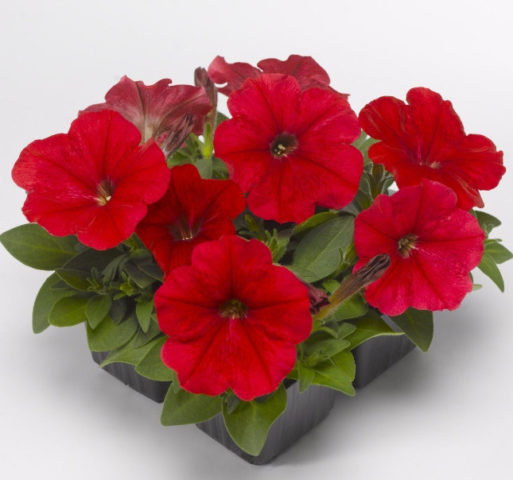
Petunia Mambo F1 red is characterized by continuous flowering for three months
Mambo F1 G.P. Orchid Wayned
A novelty variety belonging to the multiflora category. The height of the shrub does not exceed 15-20 cm. It is distinguished by a spectacular color of flowers. The main tone is pink, but dark streaks are clearly visible on it, which extend from the center of the gramophone. The diameter of the flowers reaches 6 cm.
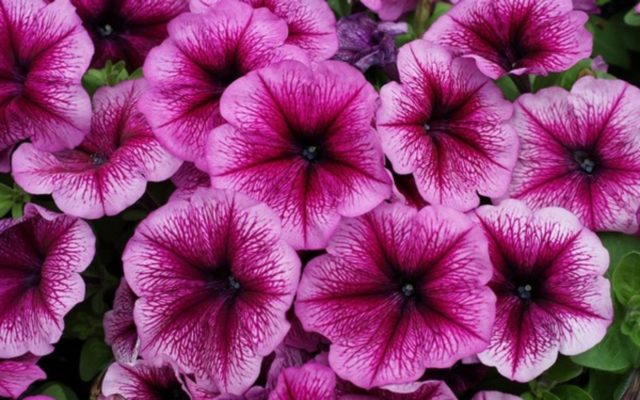
Mambo F1 Ji Pi Orchid Weined is suitable for growing in containers and open field
Mambo F1 Rose
An early flowering dwarf variety in this series. "Rose" (Rose) is characterized by abundant flowering throughout the season. The height of the bushes reaches 20-25 cm. The shade of the flower is coral pink, monotonous with a light center. Their diameter is 8 cm.
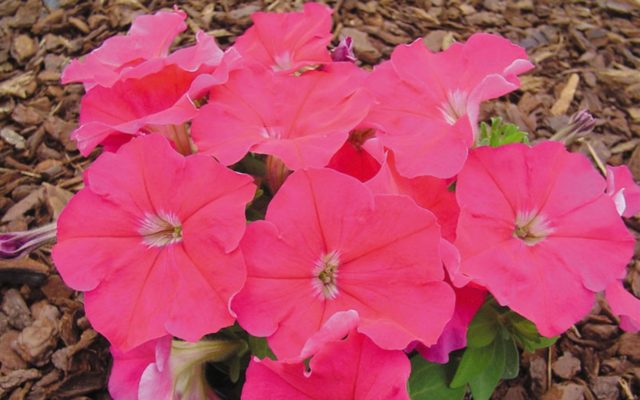
Petunia Mambo F1 Rose is not susceptible to diseases
Mambo Red Morning
A bicolor variety of undersized petunia with a stable habit throughout the season. The height of the branchy shrub does not exceed 25-30 cm. The shoots are densely leafy.Flowers along the edge have a wide pink-red border, and in the middle of the gramophone there is a light cream shade with a bright yellow center. This gives a special contrast to this look.
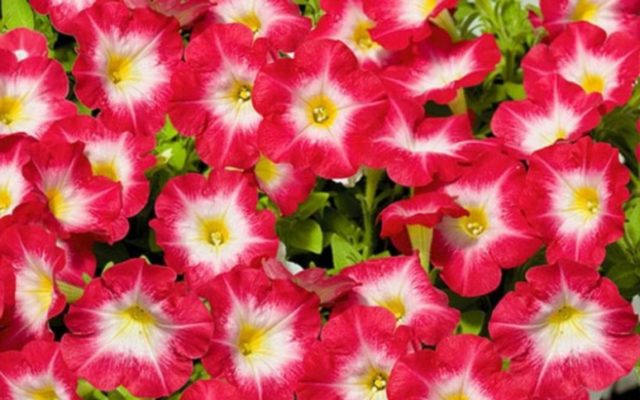
The diameter of flowers in the Mambo Red Morning variety is 7-8 cm
Advantages and disadvantages of the variety
The Mambo petunia series has a number of advantages, which makes it one of the most popular among gardeners. But it also has drawbacks that should be paid attention to so that later it does not become an unpleasant surprise.
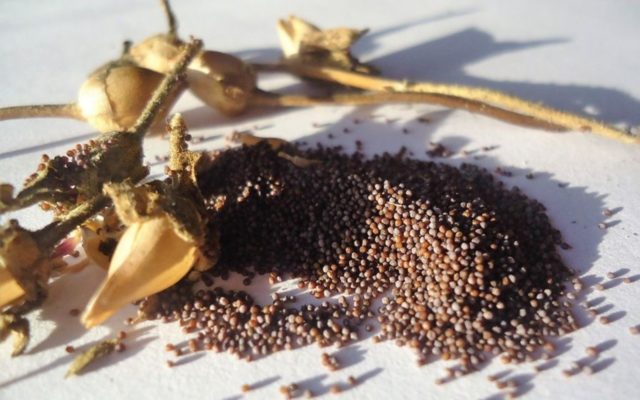
The key to the successful cultivation of Mambo petunia is high-quality seeds
Main advantages:
- undersized bushes;
- numerous buds;
- preservation of decorativeness throughout the season;
- varied color of flowers;
- resistance to adverse weather conditions;
- does not need growth regulators;
- early flowering;
- accelerated growth rate of green mass;
- does not require complex maintenance.
The disadvantages include:
- the collected seeds do not preserve the species properties of the series;
- requires enhanced feeding;
- flowers do not smell;
- needs good lighting;
- difficult early cultivation;
- sensitive to stagnation of moisture in the soil.
Reproduction methods
Mambo series petunia can be propagated vegetatively and by seeds. But in the case of choosing the latter, it is necessary to purchase planting material annually to preserve varietal qualities. Sowing should be done at the end of February.
This series is easily propagated by apical cuttings. To do this, you need to cut parts of the shoots with 5-6 sheets. Remove the bottom plates completely. Plant the seedlings at a distance of 2 cm from each other in a moist, loose substrate. It is not necessary to cover the top with a film so that the cuttings do not rot. Keep the soil slightly damp at all times. Rooting occurs in 1-2 weeks. After that, it is necessary to transplant the seedlings into separate containers and pinch over 4 sheets.
Growing and care
The process of growing petunia Mambo is laborious, but entertaining. Therefore, you need to be patient. For sowing, prepare wide containers with drainage holes no higher than 7 cm. Fill them with a loose nutrient substrate, water abundantly and level the surface. Spread the seeds on top. Then cover the containers with foil and move them to a bright place with a temperature of + 23-25 degrees. Shoots appear on the 5-7th day.
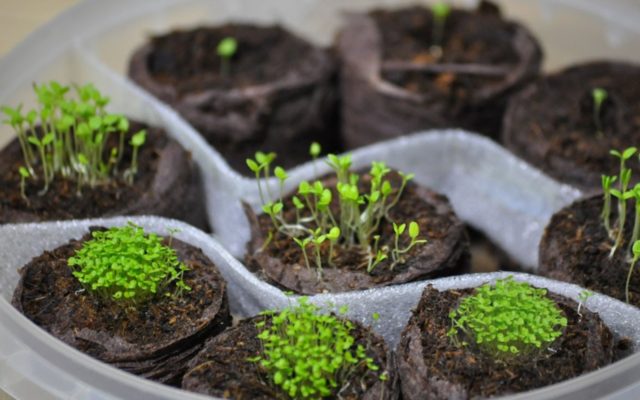
Petunia germinates in the light, so you cannot sprinkle the seeds with earth
When growing, you need to provide 12-hour daylight hours and moderate watering, as needed. When the seedlings get stronger, they need to be dived into separate containers. And after 10 days, fertilize with nitrogen fertilizers.
Mambo petunia should be transplanted to a permanent place in a pot or open ground at an air temperature of at least +18 degrees. Each plant should have 3-4 liters of substrate. It is necessary to plant petunia Mambo at a distance of 25 cm so that the plants develop fully and do not compete for food.
Further care consists in regular watering, as the top layer of the earth dries out, preventing moisture stagnation. To do this, you need to use settled water. You should also carry out top dressing every 10 days using phosphorus-potassium fertilizers.
Pests and diseases
This crop, if the growing conditions do not match and the care rules are not followed, can be affected by pests and diseases. Therefore, it is necessary to respond in a timely manner to any alarming signs, otherwise the plant may die.
Common problems:
- Late blight... The disease manifests itself with sudden changes in temperature day and night for a long time. Typical features are brown leaves and shoots.For prophylaxis and treatment, Ridomil Gold should be used.
- Powdery mildew... It can be recognized by a light, thick bloom on the leaves, which subsequently spreads to shoots and flowers. This leads to disruption of metabolic processes in tissues and premature wilting. For treatment, you need to use "Speed".
- Chlorosis... The disease in petunia Mambo develops with a lack of iron in the soil. It is characterized by a light shade of leaves with dark green veins. For treatment, you need to use "Iron Chelate".
- Spider mite... A small pest that activates during drought and heat. You can identify it on the Mambo petunia by the dejected look of the bushes, poor flowering and a thin cobweb on the tops of the shoots. Use Actellic to destroy.
- Thrips... Small brown insects that can be found on the leaves. They feed on the sap of the plant, which leads to deformation of the shoots and plates. To fight, you should use "Inta-Vir".
Application in landscape design
Petunia Mambo is widely used for landscaping areas, balconies, terraces and gazebos. Its compact flowering shrubs create vibrant accents in the garden. This series is suitable for foreground layered compositions.
It goes well with alissum, lobelia. Also, the plant can be planted in balcony boxes and pots.
Conclusion
Petunia Mambo is a spectacular series with compact, profusely flowering bushes. She became a major breakthrough in the breeding of this culture. The variety of shades of its colors allows you to give free rein to imagination and create bright compositions using monochromatic and two-tone species that will delight you throughout the season.
